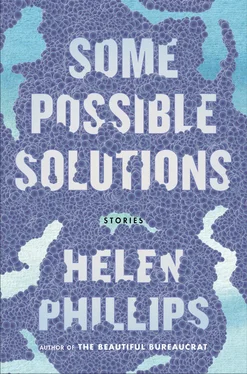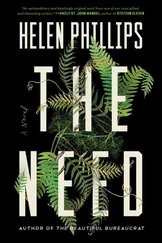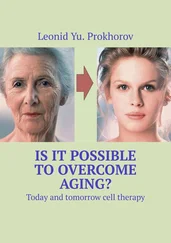* * *
The skinless cocklooks strange, pale, like something from outer space. The balls are gooey and more fragile than anything. As it hardens and grows, the cock becomes even creepier, yet somehow more defenseless, too. I’m shocked to find myself going a little bit wet, but then he shoves his eerie lips at mine.
I’m seeing parts of the human body I’ve never seen, lungs and intestines, liver and ribs, bizarre constructions.
Yet I accept him. I twist my neck, I shut my eyes. Inside it feels the same as ever; good, present. The lack of skin doesn’t make a difference. I love it terribly much. I don’t dare open my eyes.
But then, getting close, unable to keep them shut at a time like this (I know I should simply focus on his irises, his merciful dark brown irises), I look down upon two bodies, a pulsing beating body of linked organs versus a smooth clean body enwrapped in skin. I reach to pull him closer, harder, better — and as my hand goes out and around to grab his neck, I catch a glimpse of my fingers, the complicated muscles and tendons and bones, my hand a weird blood-colored bird.
When the tsunami came, we — my husband and I — were not among the good. We were in the street alongside all the neighbors who had for so many years remained strangers to us. The wave, it was thirty feet high, straight from Coney Island, the roller coaster in pieces.
It was a bright day in March.
The wave contained many things that might be listed here for poetic effect, things of the teacup-and-crib variety, but it did not look marvelous to us. It looked like garbage. The newspaper didn’t lie: You could measure the wave’s advance by the clouds of dust created by collapsing buildings.
There was that elderly couple from Apartment 1B. Campbell was their last name, or Winslow. I’d sometimes worried they could hear us when we had sex. They didn’t look rich but they did have a Jaguar, and early on Saturday mornings while I was outside waiting for the Laundromat to open, they’d walk slowly past on the way to their Jaguar. They wore nice clothes, lavender and brown, and seemed to be going somewhere halfway fun and halfway not, like the cemetery followed by the pancake house. “That Laundromat won’t open till after eight,” the Mrs. once warned me. Old people: they want things to work out. “You should go to the Laundromat down the street,” she insisted. “Thank you,” I said, politely; I’d always believed myself to be kinder than average. “Thank you,” I repeated, filled with gratitude, though of course I stayed right where I was. I’ve now shared with you everything I knew about the inhabitants of Apartment 1B.
It’s impossible to know, until you’re in a situation, whether you’re good or bad. I saw the ugly side of people, and then I saw the good side. Some people only thought of themselves. They were shoving old people out of the way.
Yet think of the punishment: for the rest of your life, you’re not worthy of a glass of water, even though you know the young are right to save themselves.








ONE OF US WILL BE HAPPY; IT’S JUST A MATTER OF WHICH ONE
Once upon a time and for all time, a Queen and King sat on twin thrones. They were beloved, this Queen and King, for she was famous across the land as a wife who valued above all else the happiness of her husband and he was famous across the land as a husband who valued above all else the happiness of his wife. A never-ending line of their devoted subjects wound through the long hallways of the castle and out onto the high road. These subjects stepped confidently into the throne room, their simple shoes softly slapping the marble floors, which were checkered like a chessboard. There was nothing servile about the behavior of the subjects; they were treated with dignity and behaved with dignity.
The subjects would place before the Queen and King the riches of their fields and streams, their forests and barns. Sunflowers would pile up, and sheaves of wheat, and the skinned bodies of small mammals. Great baskets of eggs and wooden boxes filled with honeycombs. Heaps of wool and heaps of silver fish; piles of pumpkins and piles of stones. At times these riches were accompanied by or replaced with devastating news: a fire, a flood, a drought, a debt. The lips of the Queen and the lips of the King would rise and sink accordingly, up into smiles of bounty, down into frowns of grief. The subjects well knew that joy shared is joy doubled, sorrow shared is sorrow halved, et cetera.
And thus life was good and bad, abundant and lean, ecstatic and tragic, blessed and cursed, all at once, on and on, forever and ever, until the end of time.
Sometimes young women would arrive, in pairs or in a flock; these girls danced upon the chessboard, singing folk songs at once strange and familiar, like something heard in the womb. The King did not know if it was the Queen who arranged these performances for him, or if some castle ringmaster called for the girls. They danced, flinging their scarves into the air; how exquisite the varying shades of their skin, how luminous their eyes and calves.
Yes, the King was acutely aware of them, of the heat between his legs as they threw themselves across the cool marble. And the Queen, too, was acutely aware of them, of the ways in which the shapes of their bodies aped and diverged from the shape of hers.
Did she call for them in order to bring pleasure to the King, or to taunt him, or to tempt him? The Queen herself did not know the answer to this question; indeed, had a different answer to it at each hour of the day.
Someday the King would step down from his throne, would go to one of these young women, would vanish with her down a hallway, would return to his throne sometime later, a changed man or an unchanged man. Someday the Queen would watch the King step down from his throne and go to one of the girls and take this girl to a tower in the far reaches of the castle, where he would presumably drag his finger from the center of her forehead downward, would release a cry that arced over the castle and down to the throne room where the Queen sat, listening. And when the King returned to his throne, she would love him the exact same amount as before, or would love him slightly more, or would love him quite a bit less. It was possible that when he reached for her (his palm still sweaty with another woman’s sweat), his hand would feel like a knife. Or perhaps when he reached for her, his hand would feel as exuberant as fire, and the Queen would touch the joy.
Or perhaps the King would never act; perhaps that heat between his legs would cool and shrivel. Perhaps the Queen would live out all the days of her life luxuriating in the King’s unmarred devotion, and would scarcely notice the moment when death arrived for her amid the blinding brightness of that devotion, which all along had kept her as close to paradise as a human woman could ever hope to dwell: safe, warm, calm.
Читать дальше




















